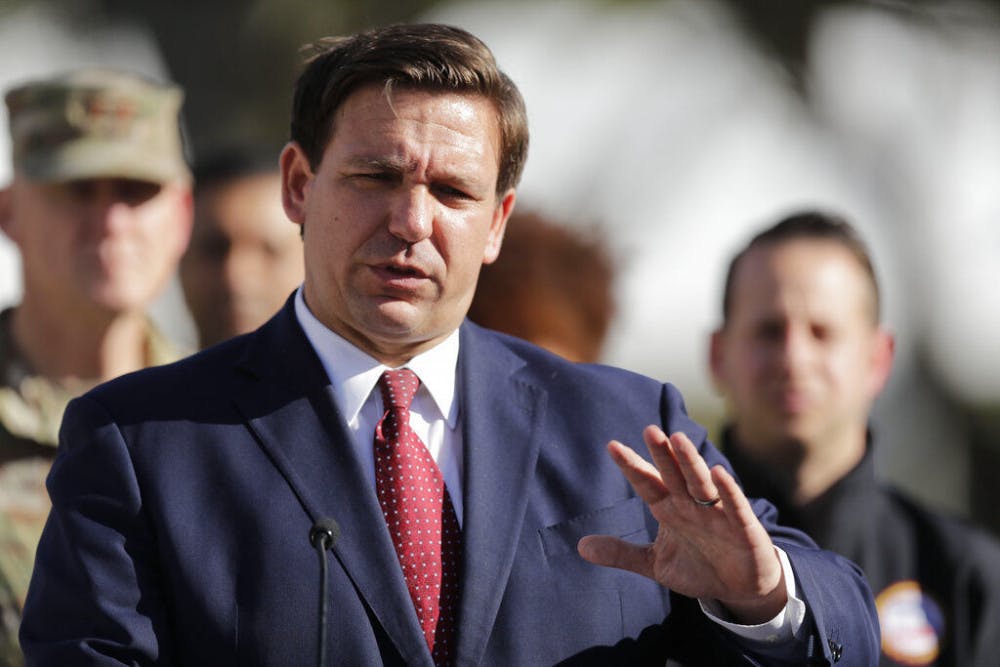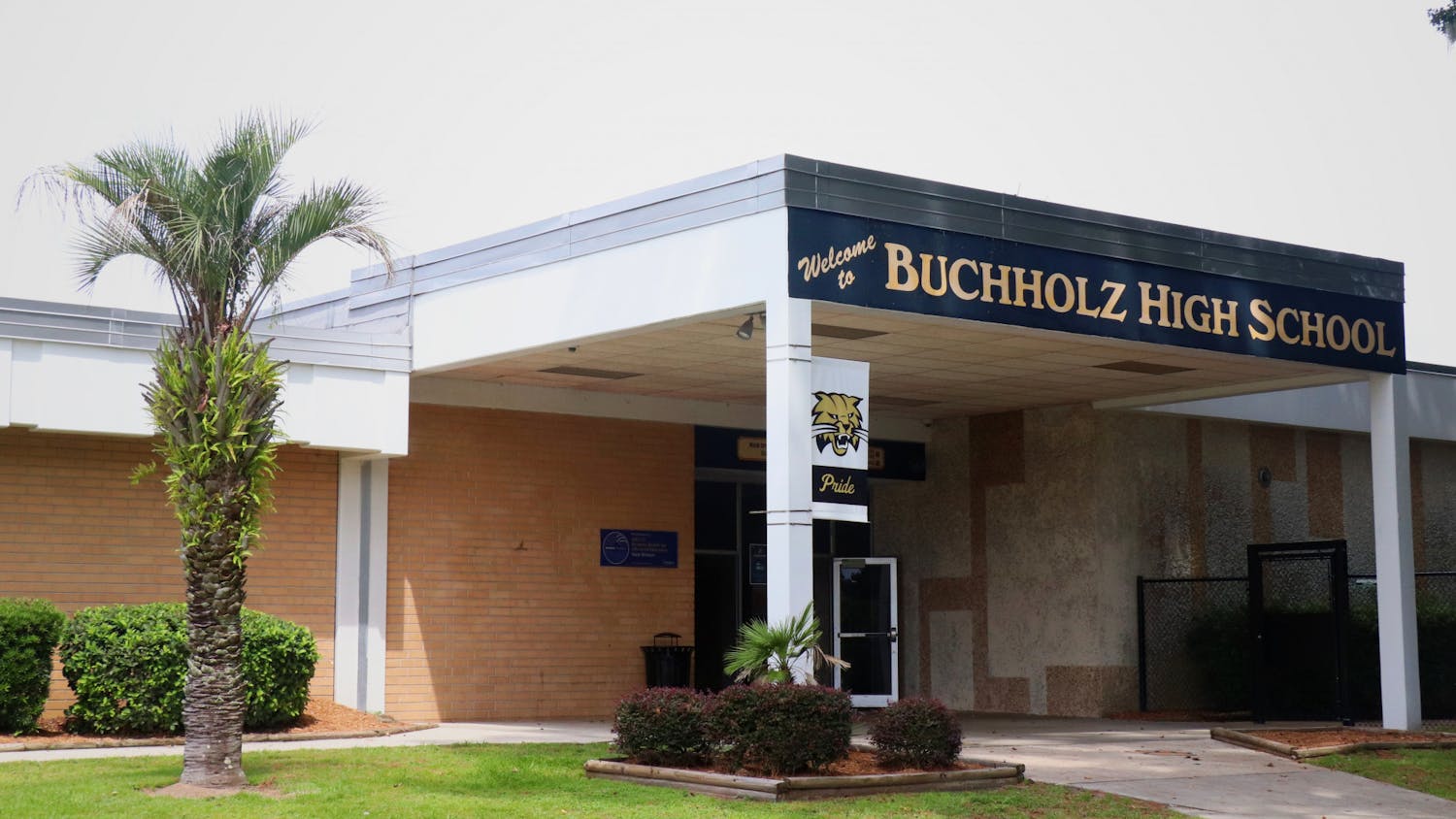Gov. Ron DeSantis signed Florida’s state budget June 2, approving $101 billion to distribute across the state.
The budget is the highest the state has ever seen and will help fund projects in Alachua County like a sports complex, a youth shelter replacement facility and a one-time $1,000 bonus for full-time teachers and first responders. However, the governor vetoed parts of the budget that would have funded transportation and medical resources for vulnerable Gainesville residents.
The budget included $600,000 for the proposed Alachua County Youth Shelter replacement, which is meant to keep children out of the criminal justice system, according to its funding request.
The shelter would provide food, counseling and education for children in crisis, including those experiencing human trafficking or domestic violence, State Rep. Chuck Clemons said.
Clemons requested funding from the state for the youth shelter replacement and the sports complex.
He said human trafficking is a problem — especially in Florida — and organizations that prevent it usually run on low budgets, so he appreciates the governor’s support.
The North Central Florida Regional Sports Complex also received $2.3 million in funding. It is expected to be built in Celebration Pointe.
The complex is being primarily funded with $30 million from Alachua County’s tourism tax funds and $35 million from the private company funding the Celebration Pointe development.
“This has statewide and regional impact for tourist development dollars,” Clemons said. “To be able to host athletic and other events in Gainesville at a venue like this is just a fabulous economic development opportunity.”
Some critics questioned the governor’s priorities, but Clemons argued that the governor vetoed over $1 billion for projects across the state. He expressed doubts about if funds would have gone to the vetoed projects whether the sports complex received funding or not.
Commissioner David Arreola criticized the decision to fund the complex over other projects in East Gainesville in a Tweet.
He argued that the $2.3 million could have been better spent on communities that need support as opposed to funding communities that are already thriving.
“It just doesn’t seem like his priorities are really considering the needs of everyday people in Florida, because that sports complex is going to make a lot of people lots of money,” Arreola said. “I wish he would value economic development in our most vulnerable communities as much as he does in the wealthiest parts of our community.”
The governor slashed a proposed $250,000 that would have gone to Gainesville Fire Rescue’s Community Resource Paramedic Program. It’s goal is to maintain a healthy quality of life in Gainesville by bringing medical services to patients who call 911 the most, such as the elderly and those with chronic diseases.
“We’ll literally show up at the person's house and knock on the door,” Joseph Hillhouse, assistant fire chief at Gainesville Fire Rescue, said. “That's something that social workers from the hospital don't necessarily have the opportunity to be able to do.”
The goal is to provide preventive care for residents who struggle to get that care so they’re not in the hospital as often, Hillhouse said. Available services include COVID-19 vaccinations, translators to help with language barriers and follow-up check-ins to continue care.
For the patients enrolled in the CRP program, 911 calls are down about 40%, and the number of patients following their recommended medical instructions are up by about 60%, Hillhouse said.
The project currently has three employees, but Hillhouse wants to expand to offer about 27 positions.
“We’re going to continue funding the program,” Commissioner Arreola said. “A quarter million dollars to scale up the program — I didn’t think it was a huge ask of the state government.”
The City of Gainesville asked the governor for $300,000 to set aside in the budget for a transfer station, but Gov. DeSantis also vetoed that proposal. A $4 million bus transfer station in East Gainesville could help provide residents in the neighborhood access to more transportation options.
The transfer station has been under consideration for years, said State Rep. Yvonne Hinson who put the transfer station on the budget to be considered. The Gainesville Regional Transit System recommended the station after a survey revealed that East Gainesville residents struggle to find nearby routes that get them to their destination on time, Hinson said.
The governor’s office also boasted about directing money to environmental resources in the budget, but much of that funding may not sufficiently help springs in and around Alachua County, Ryan Smart, executive director at Florida Springs Council, said.
Florida land conservation got a total of $400 million worth of funding this year, which Smart said he appreciates. Additionally, the budget for the Land Acquisition Trust Fund received $75 million, a $25-million increase compared to past years. The trust fund ensures land is acquired to protect and preserve endangered environments and important water sources around the state.
Smart said it would take about $15 billion to fix Florida’s springs alone.
Another major factor in restoring springs is minimizing agriculture pollution, Smart said. It contributes to 70% of all pollution in springs, but only 1% of the budget will help minimize agriculture pollution, he said.
Some vital water sources, such as the Ichetucknee Basin and the Santa Fe River, received funding for small projects, but they do not come close to addressing the big picture, Smart said.
The only project funded by the state in the Ichetucknee Basin would convert 16 septic tanks to sewer systems, which would reduce pollution by 400 pounds a year, Smart said. But pollution needs to be reduced by 200,000 pounds a year to make a real impact, he said.
Additionally, the Everglades in South Florida is getting 10 times more funding than springs in Central and North Florida, Smart said. That was decided even though the needs of both ecosystems are not drastically different, he said.
The trend of giving about 90% of water resource protection funding to South Florida started under former Gov. Rick Scott and is now continuing under DeSantis, Smart said.
“It doesn’t matter how much money you’re going to allocate if you’re not going to use that money in a way that is cost effective,” he said.
Contact Alexander Lugo at alugo@alligator.org. Follow him on Twitter @alexlugo67.

Alex is a fourth-year journalism student at UF and is in his third semester at The Alligator where he is serving as the university editor. He previously reported on university administration and the city and county commission. In his free time, he enjoys video games, traveling and being outdoors.






